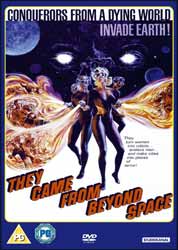|
Click here to return to the main site. DVD Review
Following a series of meteor strikes in Cornwall, Dr. Curtis Temple insists on investigating the phenomena as they landed in formation. He arrives in the village to discover that strange things are afoot. People are being taken over, but the plate in the good doctor’s head makes him immune. With the help of a fellow scientist and sympathetic locals he discovers that the aliens do not intend to invade, but are trying to repair their craft so that they can leave Cornwall... They Came from Beyond Space (1965 - 1 hr, 21 min, 42 sec) is a science fiction film directed by Freddie Francis, who worked on a number of low budget films for Hammer and Amicus. He was also a very successful cinematographer who worked on both Dune (1984) and The Elephant Man (1980) with David Lynch. The film was based on The Gods Hate Kansas by Joseph Millard, though in this case they have taken a particular dislike to Cornwall. The script was written by Milton Subotsky and Joseph Millard. The James Stevens title track is suitably fun and funky, setting the scene, for what really should be a ludicrously unbelievable plot. The film plays like a poor second cousin to Quatermass, both sharing that time in British science fiction where the hero is also a scientist, a malecentric personification of the hope that science was the cure for all ills, including visiting aliens. These were the days when polo necked women had big hair and a bigger need to be rescued. It’s all jolly good fun, if a little silly; the actors do what they can with the generic thin plot, which is generally having a good time. Michael Gough appears as The Master of the Moon, no doubt paying off his double glazing whilst hamming it up for the camera. There are some unintentionally great scenes in the film, my favourite is when they discover that the good doctor is immune to the aliens influence because of a metal plate in his head. The solution: melt down your silver cricket trophies and wear them on your head like a colander, priceless. As a dip into the silliness which often was British science fiction in the sixties, the film is a delight. It also benefits from a score by James Stevens, who had also written, amongst others, the score for Sparrow Can’t Sing (1963). He later went on to become a respected classical music writer. The colour film appears to be presented with a 1.33:1 aspect ratio picture. There are no claims that the film has been restored, however the picture is clear and clear of any noticeable faults. The disc contains no extras. 5 Charles Packer |
|---|

